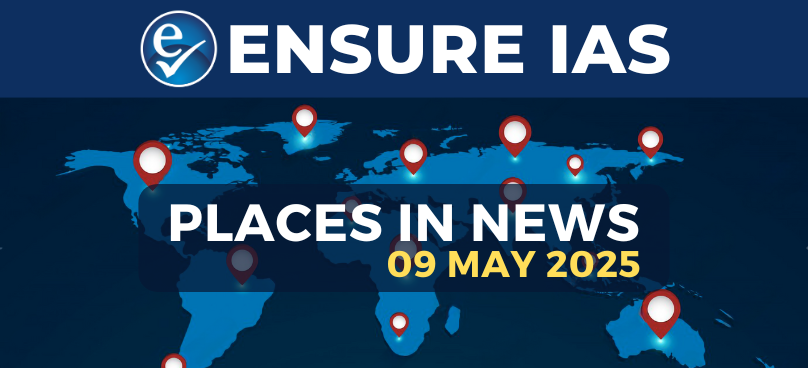- Courses
- GS Full Course 1 Year
- GS Full Course 2 Year
- GS Full Course 3 Year
- GS Full Course Till Selection
- Online Program
- GS Recorded Course
- NCERT (Recorded 500+ Hours)
- Polity Recorded Course
- Geography Recorded Course
- Economy Recorded Course
- AMAC Recorded Course
- Modern India, Post Independence & World History
- Environment Recoded Course
- Governance Recoded Course
- Science & Tech. Recoded Course
- International Relations and Internal Security Recorded Course
- Disaster Management Module Course
- Ethics Recoded Course
- Essay Recoded Course
- Current Affairs Recoded Course
- CSAT
- 5 LAYERED ARJUNA Mentorship
- Public Administration Optional
- ABOUT US
- OUR TOPPERS
- TEST SERIES
- FREE STUDY MATERIAL
- VIDEOS
- CONTACT US
What's Quantum Navigation? It Could Even Replace GPS
What's Quantum Navigation? It Could Even Replace GPS
Global Positioning Systems (GPS) have become an essential part of our daily lives, but they are not foolproof. GPS signals can be jammed, spoofed, or denied, leading to navigation errors. This is where quantum navigation comes in, a technology that could potentially replace GPS in the future.
What is Quantum Navigation?
- Quantum navigation is like having a super-accurate, self-contained GPS inside a device.
- Instead of relying on signals from satellites, it uses tiny particles called atoms to figure out where it is and how it's moving.
- Just think of it as a tiny internal compass that never gets lost, even in places where regular GPS doesn't work, like underwater or in a tunnel.
- It's like having a secret map built right into the device itself. This technology is still being developed, but it has the potential to be much more accurate and reliable than traditional GPS.
How Does Quantum Navigation Work?
Quantum Sensors:
- Highly sensitive sensors are developed using quantum particles. These sensors can measure acceleration, rotation, and gravity with extreme accuracy.
- Examples of these sensors include atomic clocks and atom interferometers.
Inertial Navigation:
- The quantum sensors continuously measure the vehicle's acceleration and rotation.
- By integrating these measurements over time, the system can calculate the vehicle's position and velocity relative to a starting point.
Gravity Gradiometry:
- Quantum sensors can also measure variations in the Earth's gravitational field.
- This information can be used to determine the vehicle's altitude and position relative to the Earth's surface.
Advantages of Quantum Navigation:
- Quantum navigation is 'unjammable', making it more secure than GPS.
- It can be used in situations where GPS is not available, such as underwater.
- Quantum navigation can provide more accurate and reliable navigation than GPS.
Will Quantum Navigation Replace GPS?
While quantum navigation has the potential to replace GPS in some situations, it is unlikely to replace GPS entirely in the near future. GPS is a convenient and widely used technology, and it will likely continue to be used in many situations. Quantum navigation will likely be used as a backup or in situations where GPS is not available.
Benefits of Satellite Data:
- Satellite data has many benefits, including monitoring extreme weather events, tracking water quality, and predicting poverty rates.
- By 2030, Earth observation insights are expected to generate more than $700 billion.
- Satellite data is also expected to indirectly remove 2 gigatons of greenhouse gases annually.
About GPS:
- GPS is a space-based radio-navigation system consisting of a constellation of satellites broadcasting navigation signals.
- Currently, 31 GPS satellites orbit the Earth at an altitude of approximately 11,000 miles.
- GPS is operated and maintained by the U.S. Department of Defense (USDOD).
How GPS Works:
- GPS satellites circle the Earth twice a day in a precise orbit.
- Each satellite transmits a unique signal and orbital parameters that allow GPS devices to decode and compute the precise location of the satellite.
- GPS receivers use this information and trilateration to calculate a user's exact location.
What is Navigation with Indian Constellation (NaVIC)?
NaVIC or the Indian Regional Navigation Satellite System (IRNSS) uses seven satellites to provide real-time positioning and timing services in India and an area extending up to 1,500 km from the country's borders. Of the seven satellites used by NaVIC at present, three are in the geostationary orbit and four in the geosynchronous orbit.
Challenges of Quantum Navigation:
- One of the main challenges of quantum navigation is the need for ultra-cold atoms, which requires complex and expensive equipment.
- Another challenge is the need for precise control over the atomic movements, which can be difficult to achieve.
Conclusion:
Quantum navigation is a promising technology that could potentially replace GPS in the future. While it has many advantages, it also faces several challenges that need to be addressed. Further research and development are needed to make quantum navigation a viable alternative to GPS.


